Biological & Mental Health: Kwaku's Case Study for Advanced Practice
VerifiedAdded on 2021/02/20
|10
|3647
|37
Report
AI Summary
This report presents a detailed analysis of Kwaku's case, focusing on the interplay between his physical and mental health. Kwaku, a 39-year-old patient, is diagnosed with multiple health issues including obesity, hypertension, diabetes, high cholesterol, and paranoid schizophrenia. The report explores the causative factors, impact of these illnesses on his life, and potential treatment options, including medical, complementary, and alternative approaches like cognitive behavioral therapy. It highlights the importance of nursing interventions in optimizing Kwaku's physical and mental well-being, discussing strategies to address impaired social interaction and disturbed thought processes. The report emphasizes the significance of a holistic approach, incorporating medication, therapy, lifestyle modifications, and safety measures to support Kwaku's recovery and improve his quality of life. This report serves as a comprehensive examination of the complex health challenges faced by Kwaku and the multifaceted strategies required for his care.
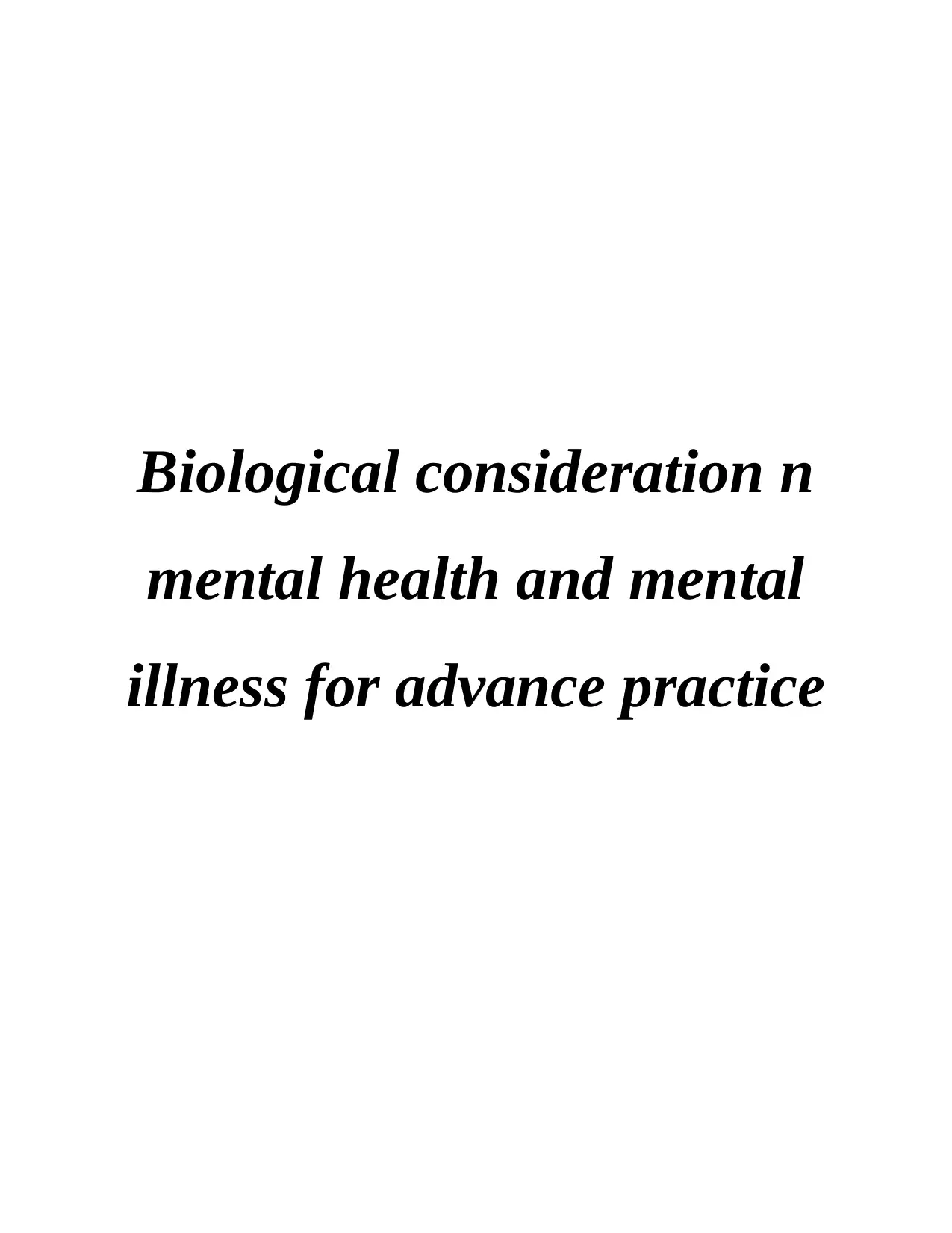
Biological consideration n
mental health and mental
illness for advance practice
mental health and mental
illness for advance practice
Paraphrase This Document
Need a fresh take? Get an instant paraphrase of this document with our AI Paraphraser
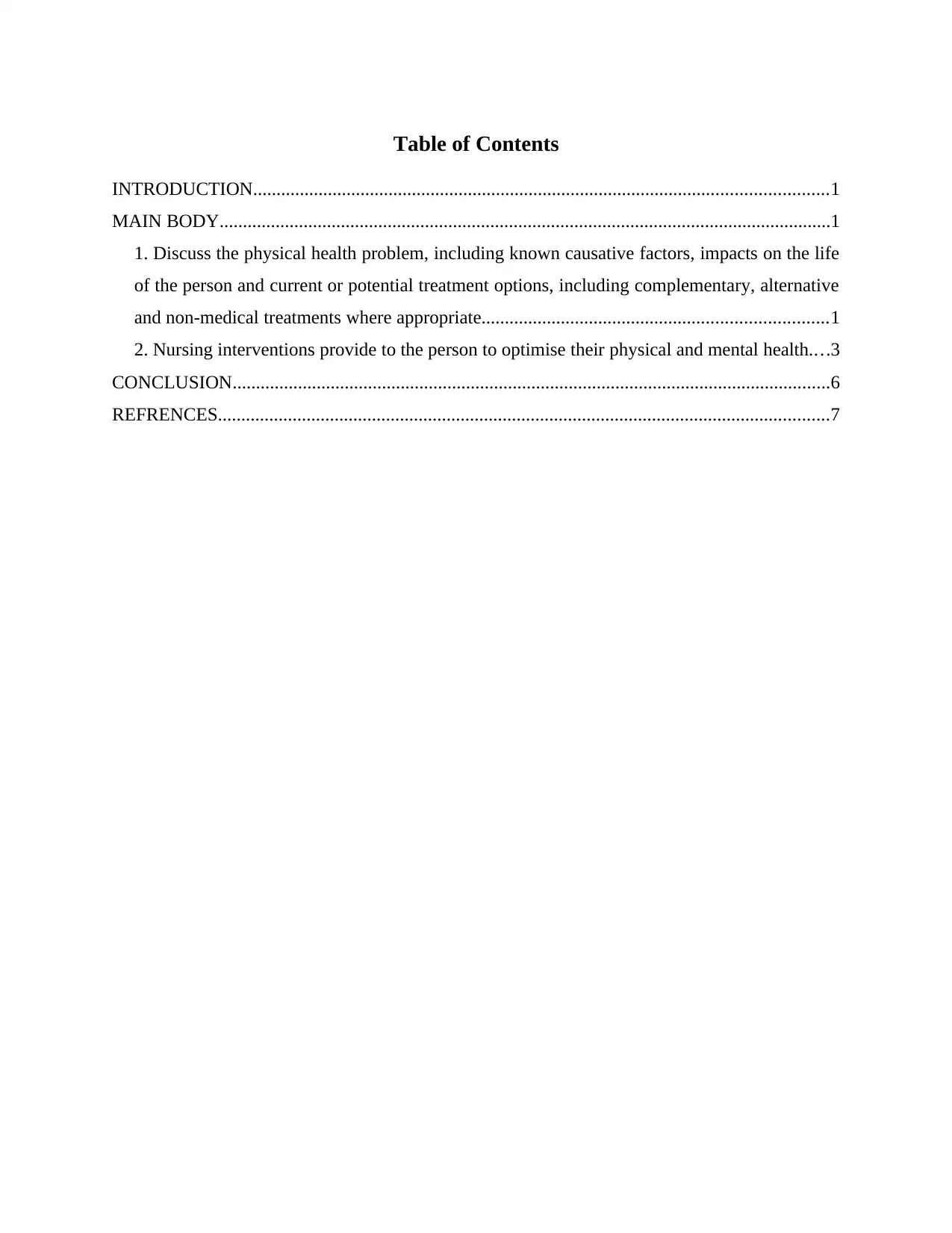
Table of Contents
INTRODUCTION...........................................................................................................................1
MAIN BODY...................................................................................................................................1
1. Discuss the physical health problem, including known causative factors, impacts on the life
of the person and current or potential treatment options, including complementary, alternative
and non-medical treatments where appropriate..........................................................................1
2. Nursing interventions provide to the person to optimise their physical and mental health....3
CONCLUSION................................................................................................................................6
REFRENCES...................................................................................................................................7
INTRODUCTION...........................................................................................................................1
MAIN BODY...................................................................................................................................1
1. Discuss the physical health problem, including known causative factors, impacts on the life
of the person and current or potential treatment options, including complementary, alternative
and non-medical treatments where appropriate..........................................................................1
2. Nursing interventions provide to the person to optimise their physical and mental health....3
CONCLUSION................................................................................................................................6
REFRENCES...................................................................................................................................7
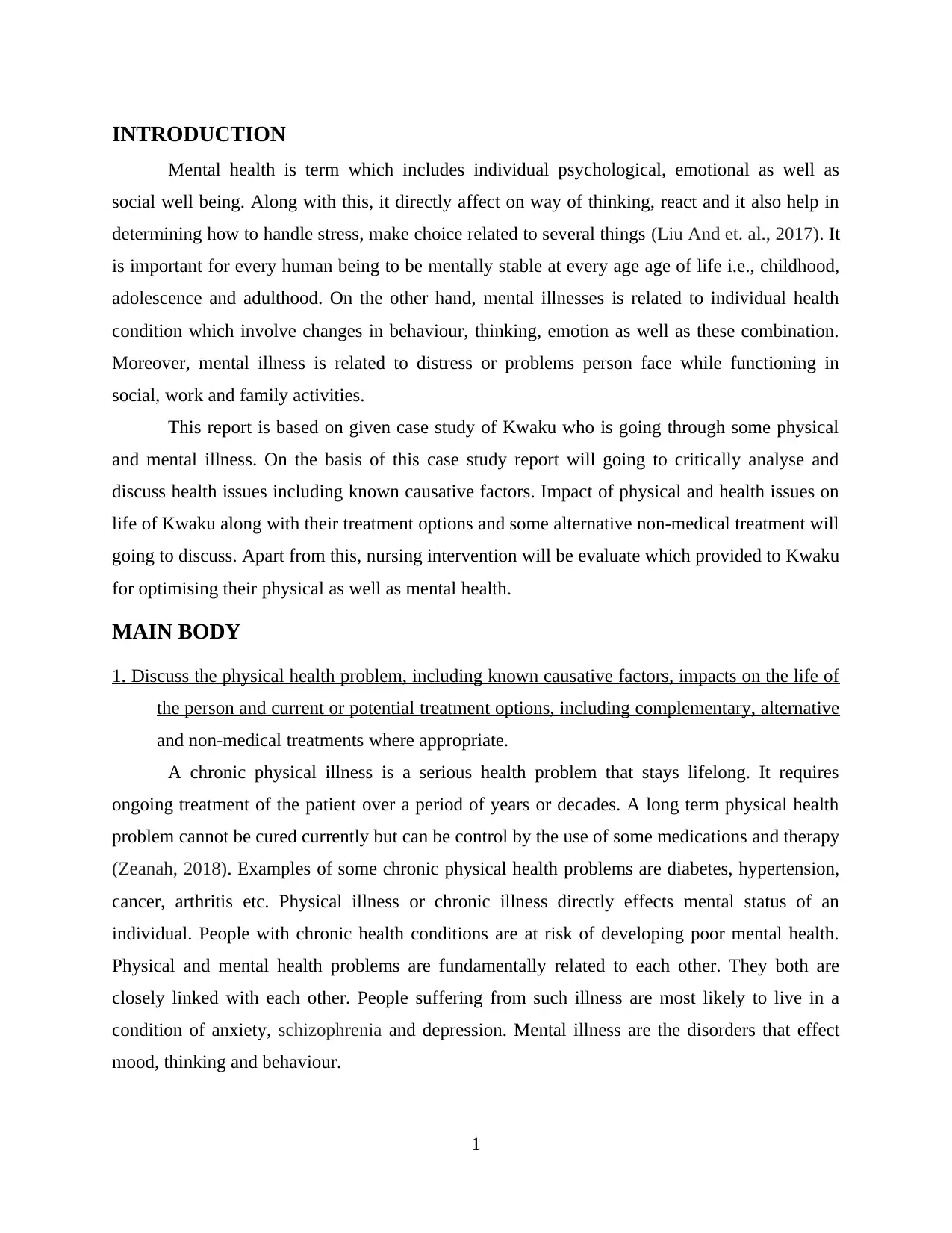
INTRODUCTION
Mental health is term which includes individual psychological, emotional as well as
social well being. Along with this, it directly affect on way of thinking, react and it also help in
determining how to handle stress, make choice related to several things (Liu And et. al., 2017). It
is important for every human being to be mentally stable at every age age of life i.e., childhood,
adolescence and adulthood. On the other hand, mental illnesses is related to individual health
condition which involve changes in behaviour, thinking, emotion as well as these combination.
Moreover, mental illness is related to distress or problems person face while functioning in
social, work and family activities.
This report is based on given case study of Kwaku who is going through some physical
and mental illness. On the basis of this case study report will going to critically analyse and
discuss health issues including known causative factors. Impact of physical and health issues on
life of Kwaku along with their treatment options and some alternative non-medical treatment will
going to discuss. Apart from this, nursing intervention will be evaluate which provided to Kwaku
for optimising their physical as well as mental health.
MAIN BODY
1. Discuss the physical health problem, including known causative factors, impacts on the life of
the person and current or potential treatment options, including complementary, alternative
and non-medical treatments where appropriate.
A chronic physical illness is a serious health problem that stays lifelong. It requires
ongoing treatment of the patient over a period of years or decades. A long term physical health
problem cannot be cured currently but can be control by the use of some medications and therapy
(Zeanah, 2018). Examples of some chronic physical health problems are diabetes, hypertension,
cancer, arthritis etc. Physical illness or chronic illness directly effects mental status of an
individual. People with chronic health conditions are at risk of developing poor mental health.
Physical and mental health problems are fundamentally related to each other. They both are
closely linked with each other. People suffering from such illness are most likely to live in a
condition of anxiety, schizophrenia and depression. Mental illness are the disorders that effect
mood, thinking and behaviour.
1
Mental health is term which includes individual psychological, emotional as well as
social well being. Along with this, it directly affect on way of thinking, react and it also help in
determining how to handle stress, make choice related to several things (Liu And et. al., 2017). It
is important for every human being to be mentally stable at every age age of life i.e., childhood,
adolescence and adulthood. On the other hand, mental illnesses is related to individual health
condition which involve changes in behaviour, thinking, emotion as well as these combination.
Moreover, mental illness is related to distress or problems person face while functioning in
social, work and family activities.
This report is based on given case study of Kwaku who is going through some physical
and mental illness. On the basis of this case study report will going to critically analyse and
discuss health issues including known causative factors. Impact of physical and health issues on
life of Kwaku along with their treatment options and some alternative non-medical treatment will
going to discuss. Apart from this, nursing intervention will be evaluate which provided to Kwaku
for optimising their physical as well as mental health.
MAIN BODY
1. Discuss the physical health problem, including known causative factors, impacts on the life of
the person and current or potential treatment options, including complementary, alternative
and non-medical treatments where appropriate.
A chronic physical illness is a serious health problem that stays lifelong. It requires
ongoing treatment of the patient over a period of years or decades. A long term physical health
problem cannot be cured currently but can be control by the use of some medications and therapy
(Zeanah, 2018). Examples of some chronic physical health problems are diabetes, hypertension,
cancer, arthritis etc. Physical illness or chronic illness directly effects mental status of an
individual. People with chronic health conditions are at risk of developing poor mental health.
Physical and mental health problems are fundamentally related to each other. They both are
closely linked with each other. People suffering from such illness are most likely to live in a
condition of anxiety, schizophrenia and depression. Mental illness are the disorders that effect
mood, thinking and behaviour.
1
⊘ This is a preview!⊘
Do you want full access?
Subscribe today to unlock all pages.

Trusted by 1+ million students worldwide
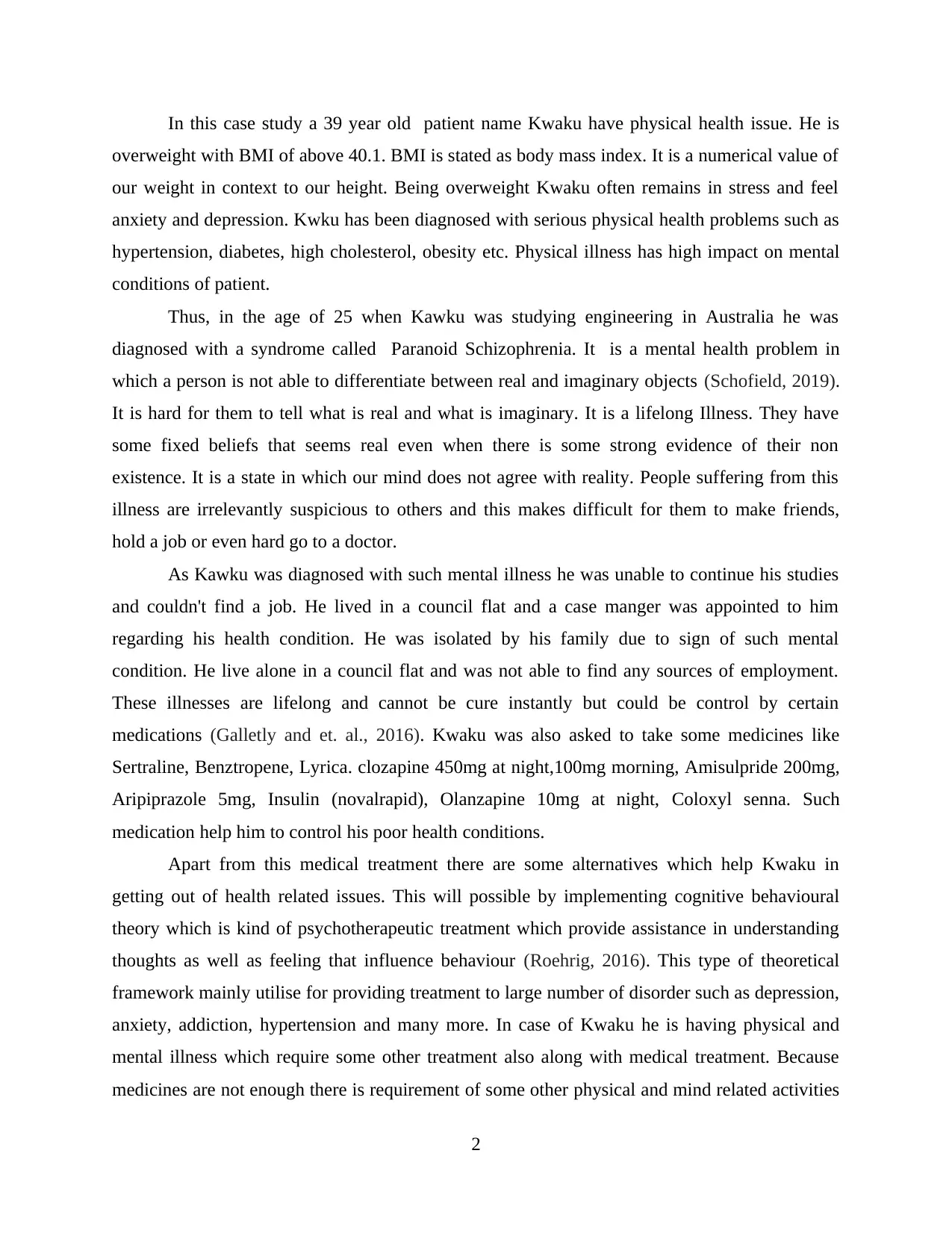
In this case study a 39 year old patient name Kwaku have physical health issue. He is
overweight with BMI of above 40.1. BMI is stated as body mass index. It is a numerical value of
our weight in context to our height. Being overweight Kwaku often remains in stress and feel
anxiety and depression. Kwku has been diagnosed with serious physical health problems such as
hypertension, diabetes, high cholesterol, obesity etc. Physical illness has high impact on mental
conditions of patient.
Thus, in the age of 25 when Kawku was studying engineering in Australia he was
diagnosed with a syndrome called Paranoid Schizophrenia. It is a mental health problem in
which a person is not able to differentiate between real and imaginary objects (Schofield, 2019).
It is hard for them to tell what is real and what is imaginary. It is a lifelong Illness. They have
some fixed beliefs that seems real even when there is some strong evidence of their non
existence. It is a state in which our mind does not agree with reality. People suffering from this
illness are irrelevantly suspicious to others and this makes difficult for them to make friends,
hold a job or even hard go to a doctor.
As Kawku was diagnosed with such mental illness he was unable to continue his studies
and couldn't find a job. He lived in a council flat and a case manger was appointed to him
regarding his health condition. He was isolated by his family due to sign of such mental
condition. He live alone in a council flat and was not able to find any sources of employment.
These illnesses are lifelong and cannot be cure instantly but could be control by certain
medications (Galletly and et. al., 2016). Kwaku was also asked to take some medicines like
Sertraline, Benztropene, Lyrica. clozapine 450mg at night,100mg morning, Amisulpride 200mg,
Aripiprazole 5mg, Insulin (novalrapid), Olanzapine 10mg at night, Coloxyl senna. Such
medication help him to control his poor health conditions.
Apart from this medical treatment there are some alternatives which help Kwaku in
getting out of health related issues. This will possible by implementing cognitive behavioural
theory which is kind of psychotherapeutic treatment which provide assistance in understanding
thoughts as well as feeling that influence behaviour (Roehrig, 2016). This type of theoretical
framework mainly utilise for providing treatment to large number of disorder such as depression,
anxiety, addiction, hypertension and many more. In case of Kwaku he is having physical and
mental illness which require some other treatment also along with medical treatment. Because
medicines are not enough there is requirement of some other physical and mind related activities
2
overweight with BMI of above 40.1. BMI is stated as body mass index. It is a numerical value of
our weight in context to our height. Being overweight Kwaku often remains in stress and feel
anxiety and depression. Kwku has been diagnosed with serious physical health problems such as
hypertension, diabetes, high cholesterol, obesity etc. Physical illness has high impact on mental
conditions of patient.
Thus, in the age of 25 when Kawku was studying engineering in Australia he was
diagnosed with a syndrome called Paranoid Schizophrenia. It is a mental health problem in
which a person is not able to differentiate between real and imaginary objects (Schofield, 2019).
It is hard for them to tell what is real and what is imaginary. It is a lifelong Illness. They have
some fixed beliefs that seems real even when there is some strong evidence of their non
existence. It is a state in which our mind does not agree with reality. People suffering from this
illness are irrelevantly suspicious to others and this makes difficult for them to make friends,
hold a job or even hard go to a doctor.
As Kawku was diagnosed with such mental illness he was unable to continue his studies
and couldn't find a job. He lived in a council flat and a case manger was appointed to him
regarding his health condition. He was isolated by his family due to sign of such mental
condition. He live alone in a council flat and was not able to find any sources of employment.
These illnesses are lifelong and cannot be cure instantly but could be control by certain
medications (Galletly and et. al., 2016). Kwaku was also asked to take some medicines like
Sertraline, Benztropene, Lyrica. clozapine 450mg at night,100mg morning, Amisulpride 200mg,
Aripiprazole 5mg, Insulin (novalrapid), Olanzapine 10mg at night, Coloxyl senna. Such
medication help him to control his poor health conditions.
Apart from this medical treatment there are some alternatives which help Kwaku in
getting out of health related issues. This will possible by implementing cognitive behavioural
theory which is kind of psychotherapeutic treatment which provide assistance in understanding
thoughts as well as feeling that influence behaviour (Roehrig, 2016). This type of theoretical
framework mainly utilise for providing treatment to large number of disorder such as depression,
anxiety, addiction, hypertension and many more. In case of Kwaku he is having physical and
mental illness which require some other treatment also along with medical treatment. Because
medicines are not enough there is requirement of some other physical and mind related activities
2
Paraphrase This Document
Need a fresh take? Get an instant paraphrase of this document with our AI Paraphraser
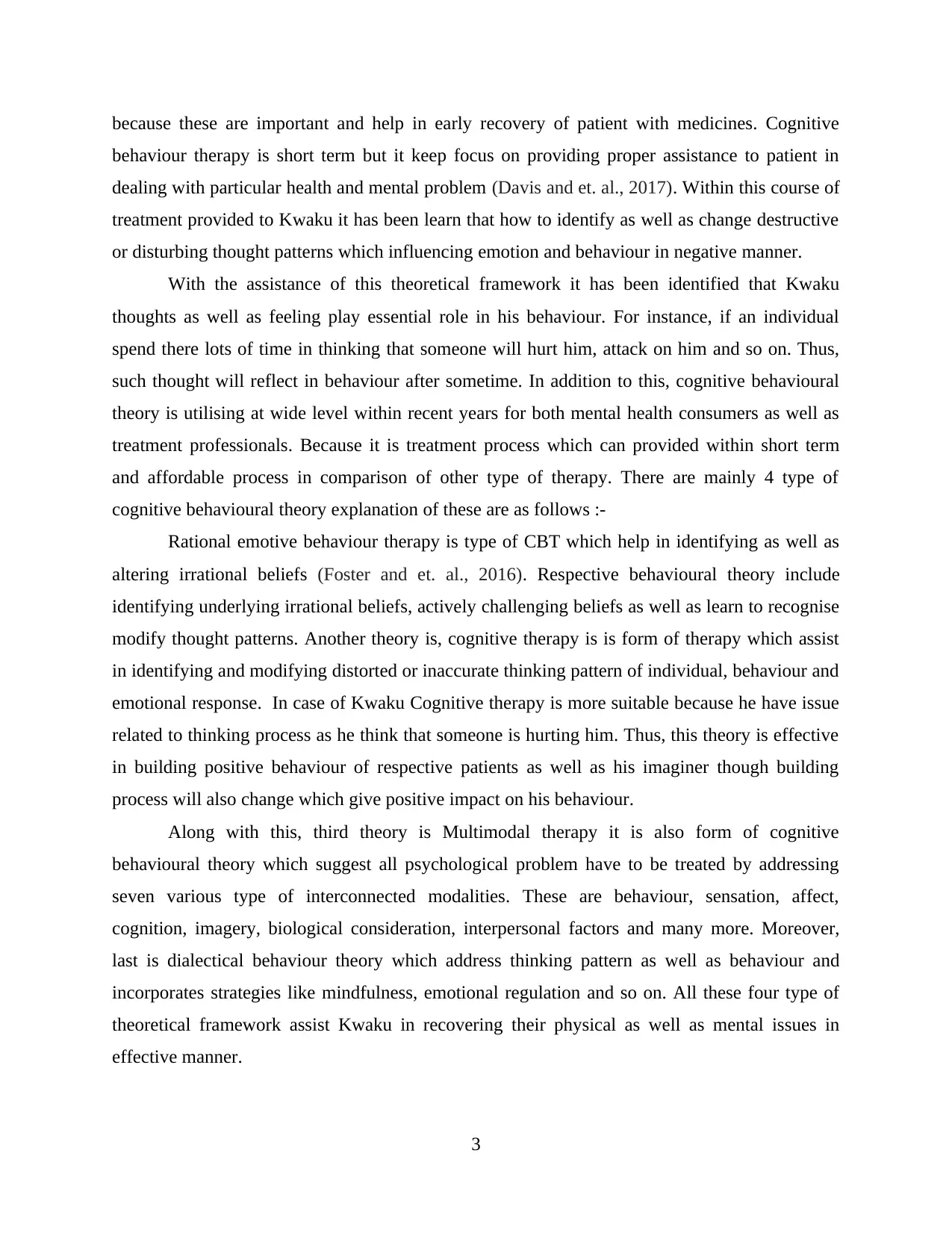
because these are important and help in early recovery of patient with medicines. Cognitive
behaviour therapy is short term but it keep focus on providing proper assistance to patient in
dealing with particular health and mental problem (Davis and et. al., 2017). Within this course of
treatment provided to Kwaku it has been learn that how to identify as well as change destructive
or disturbing thought patterns which influencing emotion and behaviour in negative manner.
With the assistance of this theoretical framework it has been identified that Kwaku
thoughts as well as feeling play essential role in his behaviour. For instance, if an individual
spend there lots of time in thinking that someone will hurt him, attack on him and so on. Thus,
such thought will reflect in behaviour after sometime. In addition to this, cognitive behavioural
theory is utilising at wide level within recent years for both mental health consumers as well as
treatment professionals. Because it is treatment process which can provided within short term
and affordable process in comparison of other type of therapy. There are mainly 4 type of
cognitive behavioural theory explanation of these are as follows :-
Rational emotive behaviour therapy is type of CBT which help in identifying as well as
altering irrational beliefs (Foster and et. al., 2016). Respective behavioural theory include
identifying underlying irrational beliefs, actively challenging beliefs as well as learn to recognise
modify thought patterns. Another theory is, cognitive therapy is is form of therapy which assist
in identifying and modifying distorted or inaccurate thinking pattern of individual, behaviour and
emotional response. In case of Kwaku Cognitive therapy is more suitable because he have issue
related to thinking process as he think that someone is hurting him. Thus, this theory is effective
in building positive behaviour of respective patients as well as his imaginer though building
process will also change which give positive impact on his behaviour.
Along with this, third theory is Multimodal therapy it is also form of cognitive
behavioural theory which suggest all psychological problem have to be treated by addressing
seven various type of interconnected modalities. These are behaviour, sensation, affect,
cognition, imagery, biological consideration, interpersonal factors and many more. Moreover,
last is dialectical behaviour theory which address thinking pattern as well as behaviour and
incorporates strategies like mindfulness, emotional regulation and so on. All these four type of
theoretical framework assist Kwaku in recovering their physical as well as mental issues in
effective manner.
3
behaviour therapy is short term but it keep focus on providing proper assistance to patient in
dealing with particular health and mental problem (Davis and et. al., 2017). Within this course of
treatment provided to Kwaku it has been learn that how to identify as well as change destructive
or disturbing thought patterns which influencing emotion and behaviour in negative manner.
With the assistance of this theoretical framework it has been identified that Kwaku
thoughts as well as feeling play essential role in his behaviour. For instance, if an individual
spend there lots of time in thinking that someone will hurt him, attack on him and so on. Thus,
such thought will reflect in behaviour after sometime. In addition to this, cognitive behavioural
theory is utilising at wide level within recent years for both mental health consumers as well as
treatment professionals. Because it is treatment process which can provided within short term
and affordable process in comparison of other type of therapy. There are mainly 4 type of
cognitive behavioural theory explanation of these are as follows :-
Rational emotive behaviour therapy is type of CBT which help in identifying as well as
altering irrational beliefs (Foster and et. al., 2016). Respective behavioural theory include
identifying underlying irrational beliefs, actively challenging beliefs as well as learn to recognise
modify thought patterns. Another theory is, cognitive therapy is is form of therapy which assist
in identifying and modifying distorted or inaccurate thinking pattern of individual, behaviour and
emotional response. In case of Kwaku Cognitive therapy is more suitable because he have issue
related to thinking process as he think that someone is hurting him. Thus, this theory is effective
in building positive behaviour of respective patients as well as his imaginer though building
process will also change which give positive impact on his behaviour.
Along with this, third theory is Multimodal therapy it is also form of cognitive
behavioural theory which suggest all psychological problem have to be treated by addressing
seven various type of interconnected modalities. These are behaviour, sensation, affect,
cognition, imagery, biological consideration, interpersonal factors and many more. Moreover,
last is dialectical behaviour theory which address thinking pattern as well as behaviour and
incorporates strategies like mindfulness, emotional regulation and so on. All these four type of
theoretical framework assist Kwaku in recovering their physical as well as mental issues in
effective manner.
3
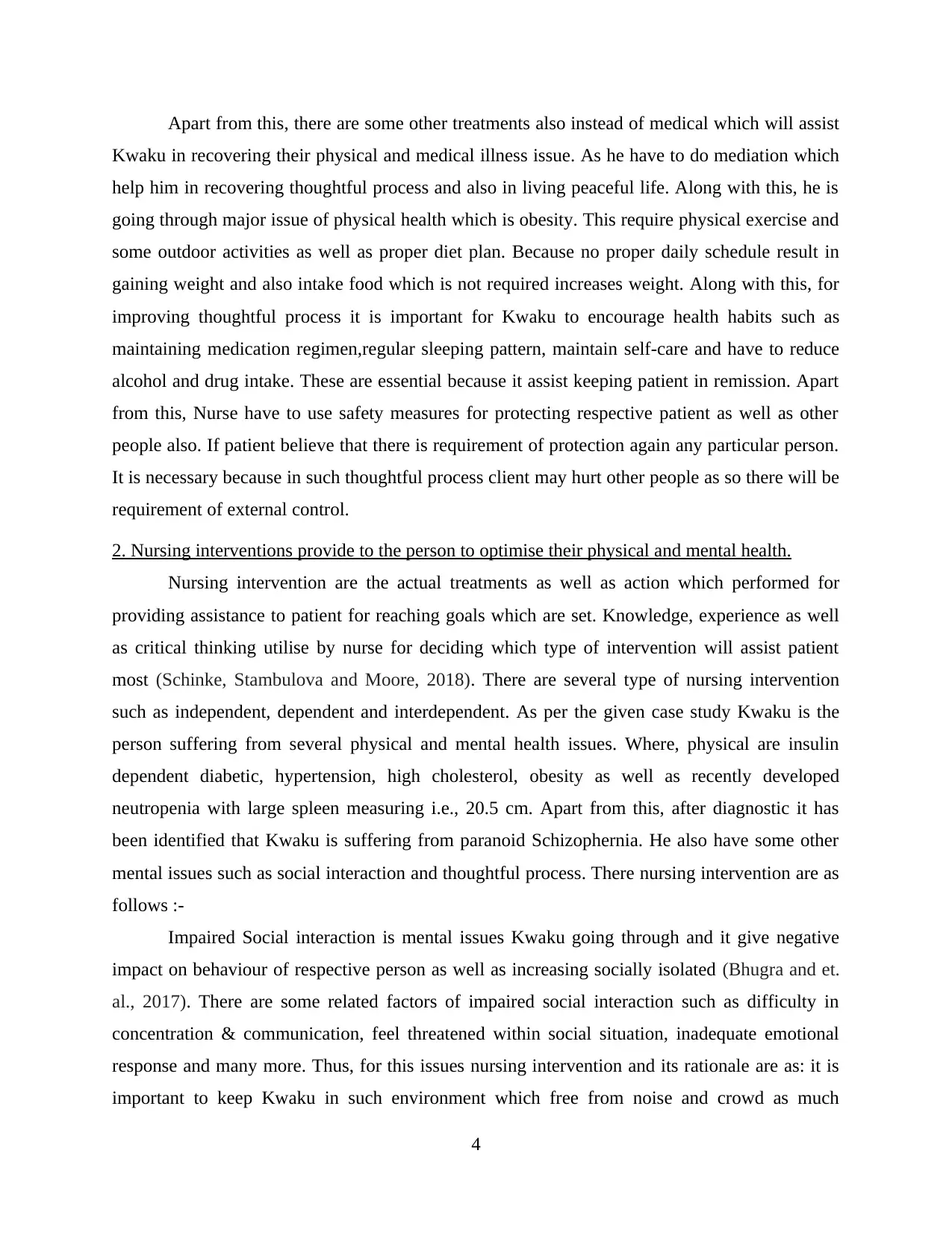
Apart from this, there are some other treatments also instead of medical which will assist
Kwaku in recovering their physical and medical illness issue. As he have to do mediation which
help him in recovering thoughtful process and also in living peaceful life. Along with this, he is
going through major issue of physical health which is obesity. This require physical exercise and
some outdoor activities as well as proper diet plan. Because no proper daily schedule result in
gaining weight and also intake food which is not required increases weight. Along with this, for
improving thoughtful process it is important for Kwaku to encourage health habits such as
maintaining medication regimen,regular sleeping pattern, maintain self-care and have to reduce
alcohol and drug intake. These are essential because it assist keeping patient in remission. Apart
from this, Nurse have to use safety measures for protecting respective patient as well as other
people also. If patient believe that there is requirement of protection again any particular person.
It is necessary because in such thoughtful process client may hurt other people as so there will be
requirement of external control.
2. Nursing interventions provide to the person to optimise their physical and mental health.
Nursing intervention are the actual treatments as well as action which performed for
providing assistance to patient for reaching goals which are set. Knowledge, experience as well
as critical thinking utilise by nurse for deciding which type of intervention will assist patient
most (Schinke, Stambulova and Moore, 2018). There are several type of nursing intervention
such as independent, dependent and interdependent. As per the given case study Kwaku is the
person suffering from several physical and mental health issues. Where, physical are insulin
dependent diabetic, hypertension, high cholesterol, obesity as well as recently developed
neutropenia with large spleen measuring i.e., 20.5 cm. Apart from this, after diagnostic it has
been identified that Kwaku is suffering from paranoid Schizophernia. He also have some other
mental issues such as social interaction and thoughtful process. There nursing intervention are as
follows :-
Impaired Social interaction is mental issues Kwaku going through and it give negative
impact on behaviour of respective person as well as increasing socially isolated (Bhugra and et.
al., 2017). There are some related factors of impaired social interaction such as difficulty in
concentration & communication, feel threatened within social situation, inadequate emotional
response and many more. Thus, for this issues nursing intervention and its rationale are as: it is
important to keep Kwaku in such environment which free from noise and crowd as much
4
Kwaku in recovering their physical and medical illness issue. As he have to do mediation which
help him in recovering thoughtful process and also in living peaceful life. Along with this, he is
going through major issue of physical health which is obesity. This require physical exercise and
some outdoor activities as well as proper diet plan. Because no proper daily schedule result in
gaining weight and also intake food which is not required increases weight. Along with this, for
improving thoughtful process it is important for Kwaku to encourage health habits such as
maintaining medication regimen,regular sleeping pattern, maintain self-care and have to reduce
alcohol and drug intake. These are essential because it assist keeping patient in remission. Apart
from this, Nurse have to use safety measures for protecting respective patient as well as other
people also. If patient believe that there is requirement of protection again any particular person.
It is necessary because in such thoughtful process client may hurt other people as so there will be
requirement of external control.
2. Nursing interventions provide to the person to optimise their physical and mental health.
Nursing intervention are the actual treatments as well as action which performed for
providing assistance to patient for reaching goals which are set. Knowledge, experience as well
as critical thinking utilise by nurse for deciding which type of intervention will assist patient
most (Schinke, Stambulova and Moore, 2018). There are several type of nursing intervention
such as independent, dependent and interdependent. As per the given case study Kwaku is the
person suffering from several physical and mental health issues. Where, physical are insulin
dependent diabetic, hypertension, high cholesterol, obesity as well as recently developed
neutropenia with large spleen measuring i.e., 20.5 cm. Apart from this, after diagnostic it has
been identified that Kwaku is suffering from paranoid Schizophernia. He also have some other
mental issues such as social interaction and thoughtful process. There nursing intervention are as
follows :-
Impaired Social interaction is mental issues Kwaku going through and it give negative
impact on behaviour of respective person as well as increasing socially isolated (Bhugra and et.
al., 2017). There are some related factors of impaired social interaction such as difficulty in
concentration & communication, feel threatened within social situation, inadequate emotional
response and many more. Thus, for this issues nursing intervention and its rationale are as: it is
important to keep Kwaku in such environment which free from noise and crowd as much
4
⊘ This is a preview!⊘
Do you want full access?
Subscribe today to unlock all pages.

Trusted by 1+ million students worldwide
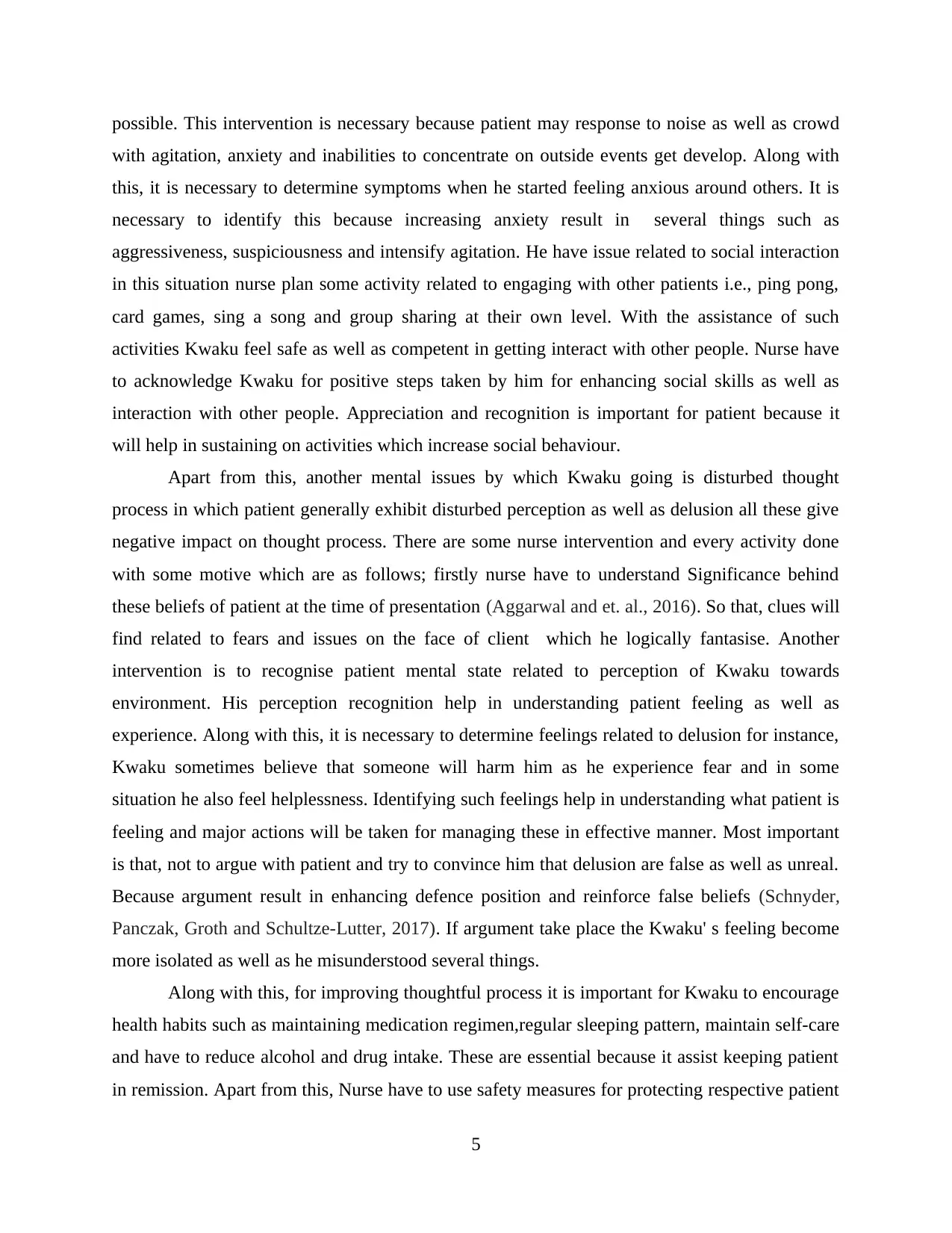
possible. This intervention is necessary because patient may response to noise as well as crowd
with agitation, anxiety and inabilities to concentrate on outside events get develop. Along with
this, it is necessary to determine symptoms when he started feeling anxious around others. It is
necessary to identify this because increasing anxiety result in several things such as
aggressiveness, suspiciousness and intensify agitation. He have issue related to social interaction
in this situation nurse plan some activity related to engaging with other patients i.e., ping pong,
card games, sing a song and group sharing at their own level. With the assistance of such
activities Kwaku feel safe as well as competent in getting interact with other people. Nurse have
to acknowledge Kwaku for positive steps taken by him for enhancing social skills as well as
interaction with other people. Appreciation and recognition is important for patient because it
will help in sustaining on activities which increase social behaviour.
Apart from this, another mental issues by which Kwaku going is disturbed thought
process in which patient generally exhibit disturbed perception as well as delusion all these give
negative impact on thought process. There are some nurse intervention and every activity done
with some motive which are as follows; firstly nurse have to understand Significance behind
these beliefs of patient at the time of presentation (Aggarwal and et. al., 2016). So that, clues will
find related to fears and issues on the face of client which he logically fantasise. Another
intervention is to recognise patient mental state related to perception of Kwaku towards
environment. His perception recognition help in understanding patient feeling as well as
experience. Along with this, it is necessary to determine feelings related to delusion for instance,
Kwaku sometimes believe that someone will harm him as he experience fear and in some
situation he also feel helplessness. Identifying such feelings help in understanding what patient is
feeling and major actions will be taken for managing these in effective manner. Most important
is that, not to argue with patient and try to convince him that delusion are false as well as unreal.
Because argument result in enhancing defence position and reinforce false beliefs (Schnyder,
Panczak, Groth and Schultze-Lutter, 2017). If argument take place the Kwaku' s feeling become
more isolated as well as he misunderstood several things.
Along with this, for improving thoughtful process it is important for Kwaku to encourage
health habits such as maintaining medication regimen,regular sleeping pattern, maintain self-care
and have to reduce alcohol and drug intake. These are essential because it assist keeping patient
in remission. Apart from this, Nurse have to use safety measures for protecting respective patient
5
with agitation, anxiety and inabilities to concentrate on outside events get develop. Along with
this, it is necessary to determine symptoms when he started feeling anxious around others. It is
necessary to identify this because increasing anxiety result in several things such as
aggressiveness, suspiciousness and intensify agitation. He have issue related to social interaction
in this situation nurse plan some activity related to engaging with other patients i.e., ping pong,
card games, sing a song and group sharing at their own level. With the assistance of such
activities Kwaku feel safe as well as competent in getting interact with other people. Nurse have
to acknowledge Kwaku for positive steps taken by him for enhancing social skills as well as
interaction with other people. Appreciation and recognition is important for patient because it
will help in sustaining on activities which increase social behaviour.
Apart from this, another mental issues by which Kwaku going is disturbed thought
process in which patient generally exhibit disturbed perception as well as delusion all these give
negative impact on thought process. There are some nurse intervention and every activity done
with some motive which are as follows; firstly nurse have to understand Significance behind
these beliefs of patient at the time of presentation (Aggarwal and et. al., 2016). So that, clues will
find related to fears and issues on the face of client which he logically fantasise. Another
intervention is to recognise patient mental state related to perception of Kwaku towards
environment. His perception recognition help in understanding patient feeling as well as
experience. Along with this, it is necessary to determine feelings related to delusion for instance,
Kwaku sometimes believe that someone will harm him as he experience fear and in some
situation he also feel helplessness. Identifying such feelings help in understanding what patient is
feeling and major actions will be taken for managing these in effective manner. Most important
is that, not to argue with patient and try to convince him that delusion are false as well as unreal.
Because argument result in enhancing defence position and reinforce false beliefs (Schnyder,
Panczak, Groth and Schultze-Lutter, 2017). If argument take place the Kwaku' s feeling become
more isolated as well as he misunderstood several things.
Along with this, for improving thoughtful process it is important for Kwaku to encourage
health habits such as maintaining medication regimen,regular sleeping pattern, maintain self-care
and have to reduce alcohol and drug intake. These are essential because it assist keeping patient
in remission. Apart from this, Nurse have to use safety measures for protecting respective patient
5
Paraphrase This Document
Need a fresh take? Get an instant paraphrase of this document with our AI Paraphraser
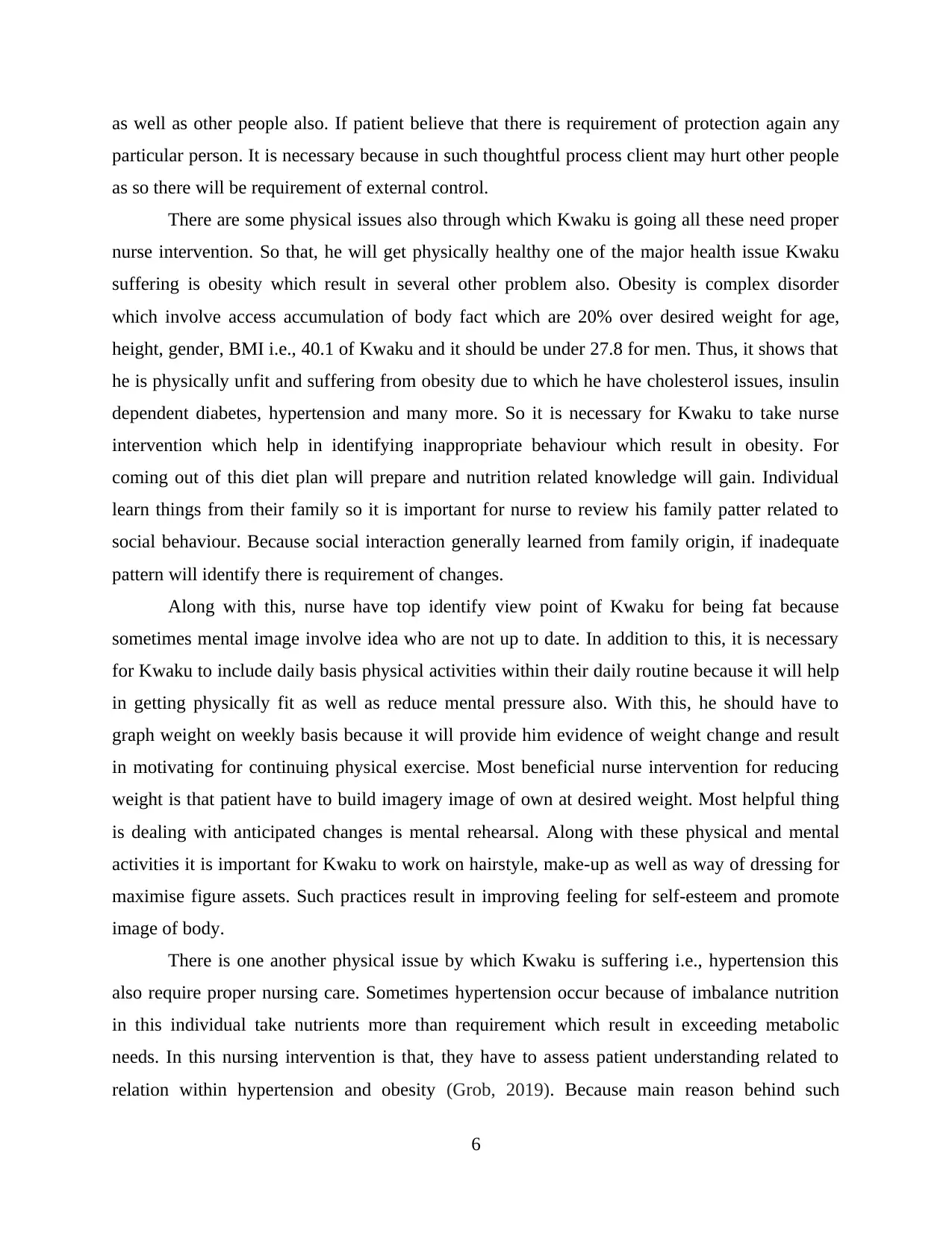
as well as other people also. If patient believe that there is requirement of protection again any
particular person. It is necessary because in such thoughtful process client may hurt other people
as so there will be requirement of external control.
There are some physical issues also through which Kwaku is going all these need proper
nurse intervention. So that, he will get physically healthy one of the major health issue Kwaku
suffering is obesity which result in several other problem also. Obesity is complex disorder
which involve access accumulation of body fact which are 20% over desired weight for age,
height, gender, BMI i.e., 40.1 of Kwaku and it should be under 27.8 for men. Thus, it shows that
he is physically unfit and suffering from obesity due to which he have cholesterol issues, insulin
dependent diabetes, hypertension and many more. So it is necessary for Kwaku to take nurse
intervention which help in identifying inappropriate behaviour which result in obesity. For
coming out of this diet plan will prepare and nutrition related knowledge will gain. Individual
learn things from their family so it is important for nurse to review his family patter related to
social behaviour. Because social interaction generally learned from family origin, if inadequate
pattern will identify there is requirement of changes.
Along with this, nurse have top identify view point of Kwaku for being fat because
sometimes mental image involve idea who are not up to date. In addition to this, it is necessary
for Kwaku to include daily basis physical activities within their daily routine because it will help
in getting physically fit as well as reduce mental pressure also. With this, he should have to
graph weight on weekly basis because it will provide him evidence of weight change and result
in motivating for continuing physical exercise. Most beneficial nurse intervention for reducing
weight is that patient have to build imagery image of own at desired weight. Most helpful thing
is dealing with anticipated changes is mental rehearsal. Along with these physical and mental
activities it is important for Kwaku to work on hairstyle, make-up as well as way of dressing for
maximise figure assets. Such practices result in improving feeling for self-esteem and promote
image of body.
There is one another physical issue by which Kwaku is suffering i.e., hypertension this
also require proper nursing care. Sometimes hypertension occur because of imbalance nutrition
in this individual take nutrients more than requirement which result in exceeding metabolic
needs. In this nursing intervention is that, they have to assess patient understanding related to
relation within hypertension and obesity (Grob, 2019). Because main reason behind such
6
particular person. It is necessary because in such thoughtful process client may hurt other people
as so there will be requirement of external control.
There are some physical issues also through which Kwaku is going all these need proper
nurse intervention. So that, he will get physically healthy one of the major health issue Kwaku
suffering is obesity which result in several other problem also. Obesity is complex disorder
which involve access accumulation of body fact which are 20% over desired weight for age,
height, gender, BMI i.e., 40.1 of Kwaku and it should be under 27.8 for men. Thus, it shows that
he is physically unfit and suffering from obesity due to which he have cholesterol issues, insulin
dependent diabetes, hypertension and many more. So it is necessary for Kwaku to take nurse
intervention which help in identifying inappropriate behaviour which result in obesity. For
coming out of this diet plan will prepare and nutrition related knowledge will gain. Individual
learn things from their family so it is important for nurse to review his family patter related to
social behaviour. Because social interaction generally learned from family origin, if inadequate
pattern will identify there is requirement of changes.
Along with this, nurse have top identify view point of Kwaku for being fat because
sometimes mental image involve idea who are not up to date. In addition to this, it is necessary
for Kwaku to include daily basis physical activities within their daily routine because it will help
in getting physically fit as well as reduce mental pressure also. With this, he should have to
graph weight on weekly basis because it will provide him evidence of weight change and result
in motivating for continuing physical exercise. Most beneficial nurse intervention for reducing
weight is that patient have to build imagery image of own at desired weight. Most helpful thing
is dealing with anticipated changes is mental rehearsal. Along with these physical and mental
activities it is important for Kwaku to work on hairstyle, make-up as well as way of dressing for
maximise figure assets. Such practices result in improving feeling for self-esteem and promote
image of body.
There is one another physical issue by which Kwaku is suffering i.e., hypertension this
also require proper nursing care. Sometimes hypertension occur because of imbalance nutrition
in this individual take nutrients more than requirement which result in exceeding metabolic
needs. In this nursing intervention is that, they have to assess patient understanding related to
relation within hypertension and obesity (Grob, 2019). Because main reason behind such
6
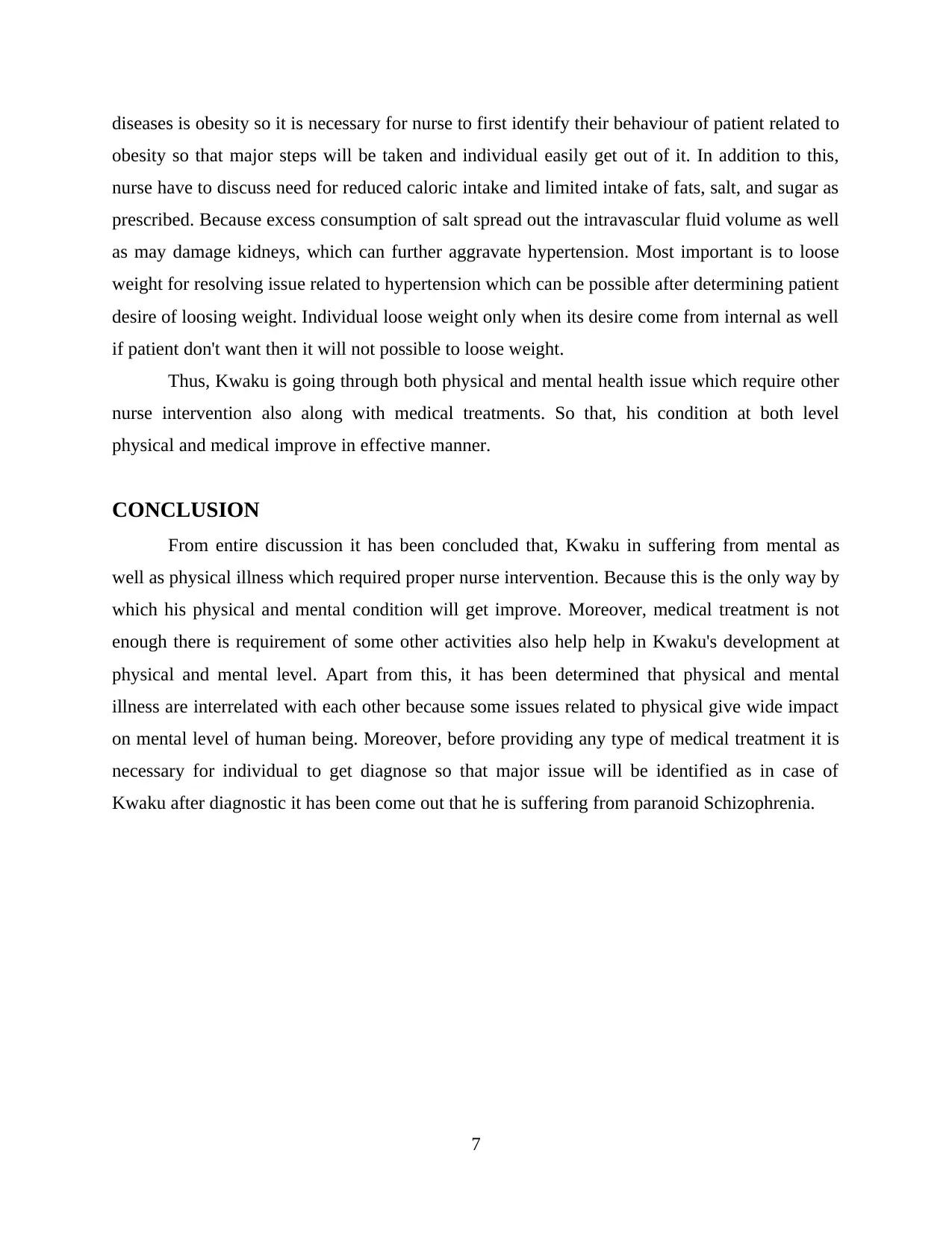
diseases is obesity so it is necessary for nurse to first identify their behaviour of patient related to
obesity so that major steps will be taken and individual easily get out of it. In addition to this,
nurse have to discuss need for reduced caloric intake and limited intake of fats, salt, and sugar as
prescribed. Because excess consumption of salt spread out the intravascular fluid volume as well
as may damage kidneys, which can further aggravate hypertension. Most important is to loose
weight for resolving issue related to hypertension which can be possible after determining patient
desire of loosing weight. Individual loose weight only when its desire come from internal as well
if patient don't want then it will not possible to loose weight.
Thus, Kwaku is going through both physical and mental health issue which require other
nurse intervention also along with medical treatments. So that, his condition at both level
physical and medical improve in effective manner.
CONCLUSION
From entire discussion it has been concluded that, Kwaku in suffering from mental as
well as physical illness which required proper nurse intervention. Because this is the only way by
which his physical and mental condition will get improve. Moreover, medical treatment is not
enough there is requirement of some other activities also help help in Kwaku's development at
physical and mental level. Apart from this, it has been determined that physical and mental
illness are interrelated with each other because some issues related to physical give wide impact
on mental level of human being. Moreover, before providing any type of medical treatment it is
necessary for individual to get diagnose so that major issue will be identified as in case of
Kwaku after diagnostic it has been come out that he is suffering from paranoid Schizophrenia.
7
obesity so that major steps will be taken and individual easily get out of it. In addition to this,
nurse have to discuss need for reduced caloric intake and limited intake of fats, salt, and sugar as
prescribed. Because excess consumption of salt spread out the intravascular fluid volume as well
as may damage kidneys, which can further aggravate hypertension. Most important is to loose
weight for resolving issue related to hypertension which can be possible after determining patient
desire of loosing weight. Individual loose weight only when its desire come from internal as well
if patient don't want then it will not possible to loose weight.
Thus, Kwaku is going through both physical and mental health issue which require other
nurse intervention also along with medical treatments. So that, his condition at both level
physical and medical improve in effective manner.
CONCLUSION
From entire discussion it has been concluded that, Kwaku in suffering from mental as
well as physical illness which required proper nurse intervention. Because this is the only way by
which his physical and mental condition will get improve. Moreover, medical treatment is not
enough there is requirement of some other activities also help help in Kwaku's development at
physical and mental level. Apart from this, it has been determined that physical and mental
illness are interrelated with each other because some issues related to physical give wide impact
on mental level of human being. Moreover, before providing any type of medical treatment it is
necessary for individual to get diagnose so that major issue will be identified as in case of
Kwaku after diagnostic it has been come out that he is suffering from paranoid Schizophrenia.
7
⊘ This is a preview!⊘
Do you want full access?
Subscribe today to unlock all pages.

Trusted by 1+ million students worldwide
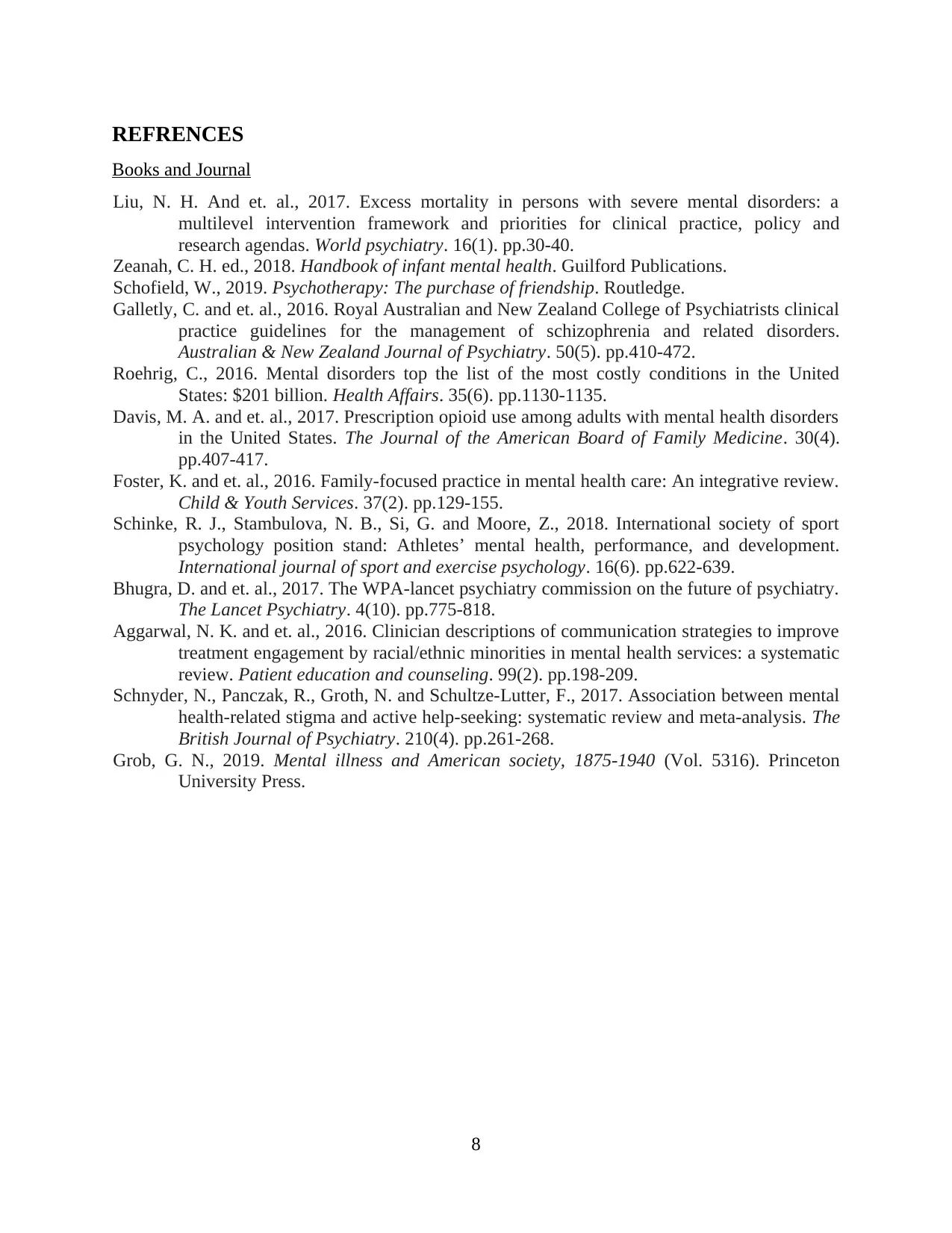
REFRENCES
Books and Journal
Liu, N. H. And et. al., 2017. Excess mortality in persons with severe mental disorders: a
multilevel intervention framework and priorities for clinical practice, policy and
research agendas. World psychiatry. 16(1). pp.30-40.
Zeanah, C. H. ed., 2018. Handbook of infant mental health. Guilford Publications.
Schofield, W., 2019. Psychotherapy: The purchase of friendship. Routledge.
Galletly, C. and et. al., 2016. Royal Australian and New Zealand College of Psychiatrists clinical
practice guidelines for the management of schizophrenia and related disorders.
Australian & New Zealand Journal of Psychiatry. 50(5). pp.410-472.
Roehrig, C., 2016. Mental disorders top the list of the most costly conditions in the United
States: $201 billion. Health Affairs. 35(6). pp.1130-1135.
Davis, M. A. and et. al., 2017. Prescription opioid use among adults with mental health disorders
in the United States. The Journal of the American Board of Family Medicine. 30(4).
pp.407-417.
Foster, K. and et. al., 2016. Family-focused practice in mental health care: An integrative review.
Child & Youth Services. 37(2). pp.129-155.
Schinke, R. J., Stambulova, N. B., Si, G. and Moore, Z., 2018. International society of sport
psychology position stand: Athletes’ mental health, performance, and development.
International journal of sport and exercise psychology. 16(6). pp.622-639.
Bhugra, D. and et. al., 2017. The WPA-lancet psychiatry commission on the future of psychiatry.
The Lancet Psychiatry. 4(10). pp.775-818.
Aggarwal, N. K. and et. al., 2016. Clinician descriptions of communication strategies to improve
treatment engagement by racial/ethnic minorities in mental health services: a systematic
review. Patient education and counseling. 99(2). pp.198-209.
Schnyder, N., Panczak, R., Groth, N. and Schultze-Lutter, F., 2017. Association between mental
health-related stigma and active help-seeking: systematic review and meta-analysis. The
British Journal of Psychiatry. 210(4). pp.261-268.
Grob, G. N., 2019. Mental illness and American society, 1875-1940 (Vol. 5316). Princeton
University Press.
8
Books and Journal
Liu, N. H. And et. al., 2017. Excess mortality in persons with severe mental disorders: a
multilevel intervention framework and priorities for clinical practice, policy and
research agendas. World psychiatry. 16(1). pp.30-40.
Zeanah, C. H. ed., 2018. Handbook of infant mental health. Guilford Publications.
Schofield, W., 2019. Psychotherapy: The purchase of friendship. Routledge.
Galletly, C. and et. al., 2016. Royal Australian and New Zealand College of Psychiatrists clinical
practice guidelines for the management of schizophrenia and related disorders.
Australian & New Zealand Journal of Psychiatry. 50(5). pp.410-472.
Roehrig, C., 2016. Mental disorders top the list of the most costly conditions in the United
States: $201 billion. Health Affairs. 35(6). pp.1130-1135.
Davis, M. A. and et. al., 2017. Prescription opioid use among adults with mental health disorders
in the United States. The Journal of the American Board of Family Medicine. 30(4).
pp.407-417.
Foster, K. and et. al., 2016. Family-focused practice in mental health care: An integrative review.
Child & Youth Services. 37(2). pp.129-155.
Schinke, R. J., Stambulova, N. B., Si, G. and Moore, Z., 2018. International society of sport
psychology position stand: Athletes’ mental health, performance, and development.
International journal of sport and exercise psychology. 16(6). pp.622-639.
Bhugra, D. and et. al., 2017. The WPA-lancet psychiatry commission on the future of psychiatry.
The Lancet Psychiatry. 4(10). pp.775-818.
Aggarwal, N. K. and et. al., 2016. Clinician descriptions of communication strategies to improve
treatment engagement by racial/ethnic minorities in mental health services: a systematic
review. Patient education and counseling. 99(2). pp.198-209.
Schnyder, N., Panczak, R., Groth, N. and Schultze-Lutter, F., 2017. Association between mental
health-related stigma and active help-seeking: systematic review and meta-analysis. The
British Journal of Psychiatry. 210(4). pp.261-268.
Grob, G. N., 2019. Mental illness and American society, 1875-1940 (Vol. 5316). Princeton
University Press.
8
1 out of 10
Related Documents
Your All-in-One AI-Powered Toolkit for Academic Success.
+13062052269
info@desklib.com
Available 24*7 on WhatsApp / Email
![[object Object]](/_next/static/media/star-bottom.7253800d.svg)
Unlock your academic potential
Copyright © 2020–2026 A2Z Services. All Rights Reserved. Developed and managed by ZUCOL.





